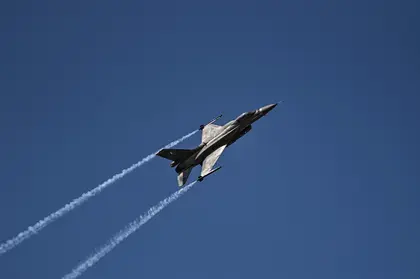The pro-Kremlin milblogger FighterBomber posted footage on Thursday, June 20, which shows what appears to have been a strike from a Russian 3,000-kilogram (6,600-pound) FAB-3000 M54 “dumb” aircraft bombs turned into stand-off bomb using a so-called “universal planning and correction module” (UPMK).
The FAB-3000 is 3.3 meters (10.8 feet) long and a mid-point diameter of 1 meter (3.3 feet). It contains 1,200 kilograms (2,650 pounds) of high explosive, either straight TNT or a TNT/RDX/Aluminum mix. The bomb is fitted with three fuses which guarantees it will function at whatever angle it strikes the target.
JOIN US ON TELEGRAM
Follow our coverage of the war on the @Kyivpost_official.
The use of a bomb of this size, if confirmed, would potentially pose a significant additional threat to Ukrainian forces’ defensive positions and civilian infrastructure in the border regions. Prior to Thursday’s attack the largest aerial glide bomb deployed by Moscow’s forces was a UMPK-equipped 1,500-kilogram (3,300-pound) class FAB-1500 M54 which was filmed striking a target in Berislav in the Kherson Region in March.
According to the Russian state news agency TASS, the FAB-3000 strike was aimed at a three-story building being used by the Ukrainian Armed Forces (AFU) in the town of Liptsy in the Kharkiv region. The bomb failed to hit its target directly, but such was the size of the resulting explosion it was damaged and destroyed nearby buildings, one of which may have been a medical facility and another a NovaPoshta courier office.

SBI Investigating F-16 Crash That Killed Pilot Oleksii Mes
Mainstream military commentators suggest the accuracy of UMPK-equipped glide bombs is poor but, with a claimed main destructive radius of 230 meters (750 feet) with lethal fragments out to over 1,200 meters (4,000 feet) , even a “near miss” by a FAB-3000 is difficult to defend against.
To date, there have been over 3,500 reported glide bomb attacks carried out by Russian aerospace forces with the most popular types being the smaller FAB 250- and 500-kilogram (550 and 1,100 pound) bombs. The question is does Thursday’s use of their big brother signal a change in the types of bombs to be used or is it, as the FighterBomber milblogger suggests, a spectacular effort to allow Russian forces to claim a record of the use of the largest weapon.
The use of the weapon raises two main questions. Firstly, how many of them are currently available? The Russian Ministry of Defense reported in March, during a visit to an aircraft bomb factory in Nizhny Novgorod by the then Russian Defense Minister, Sergei Shoigu, that serial production of the bombs had commenced.

The other question is which Russian aircraft is capable of employing these huge bombs. The FAB-3000 M54 was originally designed to be used by strategic bombers, such as the Tu-22M3 (NATO: Backfire) which is only capable of carrying two of the monsters. Russia’s usual platform for delivering the smaller glide bombs has been Sukhoi Su-34 (NATO: Fullback) medium-range fighter-bombers. But according to the military issues website The War Zone the bomb would beyond the payload capacities of weapons pylons on them and most other Russian tactical aircraft.
It suggests that the MiG-31K (NATO: Foxhound), designed to carry the Kinzhal air-launched ballistic missiles that weighs 4,300 kilograms (9,500 pounds) could be an option, but there are only limited numbers of those aircraft. While delivery by the MiG-31K or Tu-22M3 would allow the bombs to be dropped from a higher altitude and, thereby, increase the range of a FAB 3000 glide bomb, it could bring both aircraft into the envelope of Ukrainian long-range air defense missiles, as two of it’s A-50 AWACS aircraft found out earlier this year, and the forthcoming F-16 fighters.
It seems likely that if this was indeed a FAB-3000 M54 glide bomb this was a “statement” attack as another demonstration of Russia’s supposed capability rather than the signal of an all-out campaign deploying these monstrous bombs.
You can also highlight the text and press Ctrl + Enter






